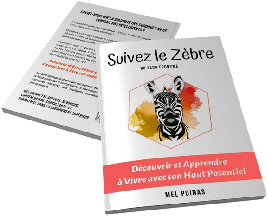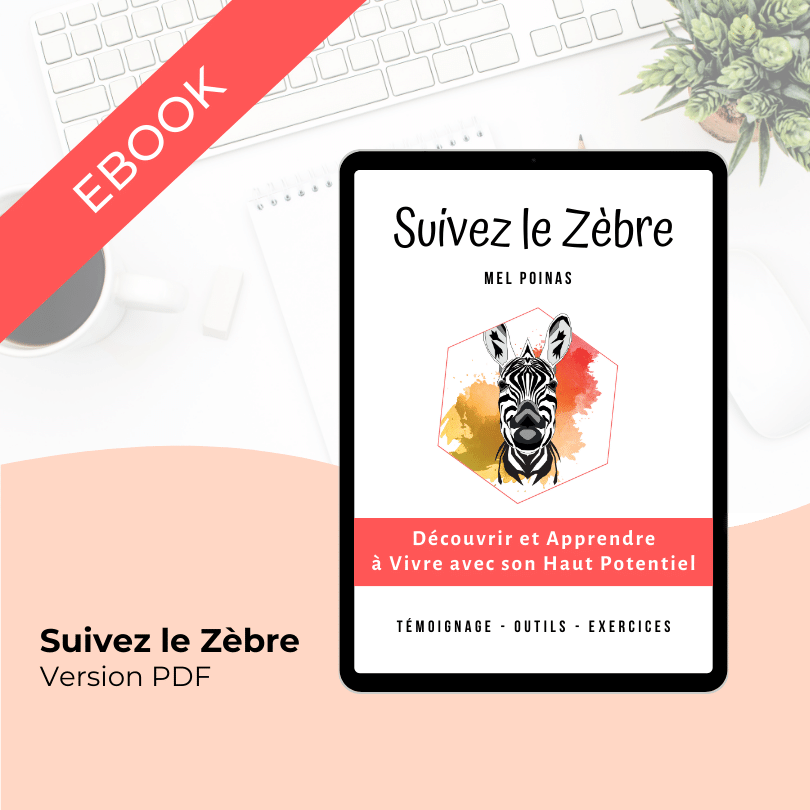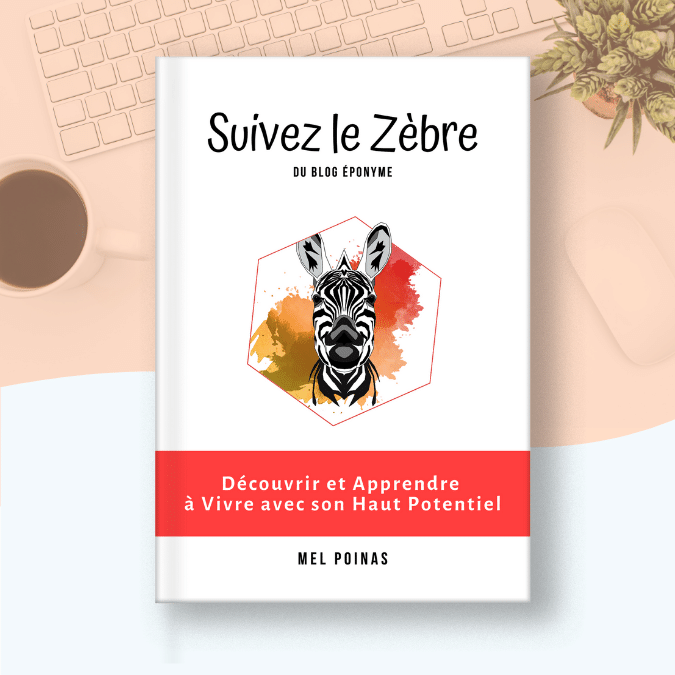In just a few days, the Follow the Zebra blog will be celebrating its 5th anniversary. 2017, I’m Mel Poinas, the blog‘s founder. I became interested in HPI after I was diagnosed myself.
In recent years, HPI has become a real fashion phenomenon. At Suivez le zèbre, we don’t mind – on the contrary. We prefer to get people interested, even if a few clichés still persist.
While the neuroscientific community seems to be more or less in tune with the concept of High Potential, a new concept has emerged that is stirring up passions: High Emotional Potential!
Where does the term High Emotional Potential come from ?
HPE, or High Emotional Potential, is a concept coined by the controversial psychoanalyst Raymonde Hazan and taken up by certain practitioners. We’d love to give you a clear definition of what HPE is, but it’s a bit of a grey area!
Even Raymonde Hazan states in one of her very recent videos that her concept has been completely hijacked, explaining that HPE without HPI makes no sense ! We advise you to watch it to the end.
We’ve never read the books by Raymonde Hazan but we loved her quirky, authentic style! 😁
Many of our new readers are asking us about HPE, High Emotional Potential. When you explain that HPE is not a concept recognized by the scientific community, but an invention of Raymonde Hazan ‘s that has been taken up by certain people to turn it into a business, you incur the wrath of some! Yes, yes, I assure you…
Since we love to democratize HPI but don’t really like charlatans and being insulted, we thought it was time to do an article dedicated to HPE.
HPE, the hijacked concept on which professionals are making money!
This is the kind of definition you can read on unscrupulous sites supposedly run by psychologists (Raymonde also talks about this in her video!): HPE is: a high emotional potential, corresponding to an emotional intelligence far superior to that of people in his or her age group – an emotional quotient (EQ) in the top 2.3%. It’s a form of giftedness characterized by highly developed emotional capacities.
This definition is a copy-paste of the HPI definition, except that the I for Intellectual has been replaced by the E for Emotional. However, these two concepts cannot be compared. For one thing, we have no idea what percentage of people might be affected, since HPE is a notion without any foundation or scientific study on the part of its creator or other specialists…
Let’s try a different approach! Why has the HPE concept invented by Raymonde Hazan exploded like a bomb in recent years, creating a craze and tidal wave that has completely overtaken her?
HPE, a term that conceals several concepts
Indeed, to understand the rise of the term HPE, it’s important to identify what it represents for people who identify with the concept.
- Manage and control your emotions
- Hypersensitive or highly sensitive, you feel everything very strongly
- An over-empathy where you always seem to have emotion on the edge of your lips
When we talk to our readers about HPE, we tend to be confronted with the last two propositions: hypersensitivity and over-empathy. However, the definition to which HPE would best correspond would be the first: an ability to know oneself very well and to control one’s emotions and reactions.
HPI is a cognitive function associated with IQ(intelligence quotient) measurement. Understandably, those interested in EQ(Emotional Quotient) have drawn parallels with HPE (High Emotional Potential).
If you find yourself in the hypersensitivity category, don’t hesitate to take our test. You’ll be asked to make a symbolic contribution by offering the team a coffee (1coffee = 1 euro).
What is QE?
In 1987, in an article published in Mensa Magazine, Dr Keith Beasley used the term ” emotional quotient “. Yes, Mensa Magazine, so we were already trying to assessemotional intelligence. In 1985, Wayne Payne used the term ” emotional intelligence ” for the first time in his doctoral thesis.
This concept of emotional intelligence was finally theorized in 1990 by two American psychologists, Peter Salovey and John Mayer, and later by psychologist Daniel Goleman who made the EQ concept popular. Continuing the research of his two contemporaries, he published the results of his study in 1995 in his book Emotional Intelligence a best-seller with millions of copies sold.
So is HPE innate or acquired?
If we use EQ (emotional quotient) to define HPE(high emotional potential), just as we use IQ (intelligence quotient) to define HPI(high intellectual potential), then that’s where the two concepts differ. HPI is genetic and innate. IQ varies little over a person’s lifetime. You’re born HPI, you die HPI. But you can work on your EQ and become an HPE, because emotional intelligence is a learned skill.
Which means that anyone could become an HPE! This contradicts the definition given in the introduction by a psychologist who claims that these high emotional capacities concern 2.3% of the population.
The characteristics of emotional intelligence
Emotional intelligence encompasses abilities related to :
- understanding one’s own emotions: highly objective emotional self-awareness. They are able to perceive their own condition with great ease, as well as its causes, and thus talk about it and find solutions.
- empathy: they often readily recognize the emotions of others, even without verbal or explicit information. They can feel these emotions to better understand them, without letting themselves be overwhelmed by them.
- interpersonal and leadership skills. They are excellent leaders and speakers. Optimistic, attuned to the feelings of others, and a force to be reckoned with, they help people move forward and are a force to be reckoned with in the world of management.
These are people who also have perfect control of their ego and don ‘t let it get in the way. They can :
- accept criticism and responsibility
- to move on after making a mistake
- to say no when necessary
- share feelings with others
- solve problems in a way that suits everyone
- empathy for others
- good listening skills
- to know why we do what we do
- not to pass judgment on others
Conclusion: does HPE exist or not?
Since the term was coined, everyone has formed an opinion on the subject. A quick Google search for HPE offers over 62 million results. That’s right! FYI, it’s more than HPI but HPE is also Hewlett Pacard Industry 😁.
At Suivez le Zèbre, we’re very much in favor of everyone finding their place in the world. When you have HPI, you feel everything very intensely. This can lead to misalignment or emotional mismanagement. Working on emotional intelligence seems to us very important, even essential, for people with High Potential.
But, if we answer the question, as we’ve just seen, in concrete terms, no, it doesn’t exist in the form of a measurable, identifiable and recognized high emotional potential. Then again, maybe Raymonde Hazan does possess clairvoyant gifts and specialists will be able to prove it later, who knows?
What about personality tests (HPI / HPE)?
Personality tests that assess your emotional potential help you get to know and understand how you function. But once again, beware of charlatans and paid online tests, which have become a real business. I myself took this kind of test to teach at my school, and you’ll find my results in the article on HPI.
Prefer professionals who favor the termemotional intelligence to HPE and if your psychologist uses this term, ask him what he means by HPE, high emotional potential and if he knows what its origin is 😉.
You can also find more information, resources and tools on Giftedness in Mel POINAS‘ book. With a lot of humor, Mel tells the story of the discovery of her giftedness and the routines she put in place to finally find her place!

Le livre
Écrit par une HPI !
Un témoignage et des solutions concrètes pour découvrir, comprendre et apprendre à vivre en étant HPI.



To go further, you can read
- How to manage hypersensitivity and emotions
- Is an HPI necessarily hypersensitive?
- What is being Gifted?
- Online IQ tests for a fee, beware of scams?
- Mary Rocamora’s pre-test
- Being a High Potential Woman














